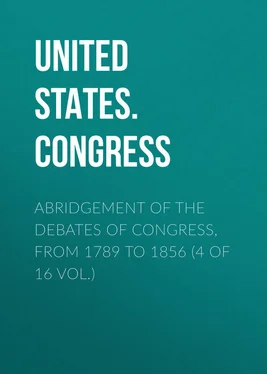United States. Congress - Abridgement of the Debates of Congress, from 1789 to 1856 (4 of 16 vol.)
Здесь есть возможность читать онлайн «United States. Congress - Abridgement of the Debates of Congress, from 1789 to 1856 (4 of 16 vol.)» — ознакомительный отрывок электронной книги совершенно бесплатно, а после прочтения отрывка купить полную версию. В некоторых случаях можно слушать аудио, скачать через торрент в формате fb2 и присутствует краткое содержание. Жанр: Политика, foreign_edu, на английском языке. Описание произведения, (предисловие) а так же отзывы посетителей доступны на портале библиотеки ЛибКат.
- Название:Abridgement of the Debates of Congress, from 1789 to 1856 (4 of 16 vol.)
- Автор:
- Жанр:
- Год:неизвестен
- ISBN:нет данных
- Рейтинг книги:3 / 5. Голосов: 1
-
Избранное:Добавить в избранное
- Отзывы:
-
Ваша оценка:
- 60
- 1
- 2
- 3
- 4
- 5
Abridgement of the Debates of Congress, from 1789 to 1856 (4 of 16 vol.): краткое содержание, описание и аннотация
Предлагаем к чтению аннотацию, описание, краткое содержание или предисловие (зависит от того, что написал сам автор книги «Abridgement of the Debates of Congress, from 1789 to 1856 (4 of 16 vol.)»). Если вы не нашли необходимую информацию о книге — напишите в комментариях, мы постараемся отыскать её.
Abridgement of the Debates of Congress, from 1789 to 1856 (4 of 16 vol.) — читать онлайн ознакомительный отрывок
Ниже представлен текст книги, разбитый по страницам. Система сохранения места последней прочитанной страницы, позволяет с удобством читать онлайн бесплатно книгу «Abridgement of the Debates of Congress, from 1789 to 1856 (4 of 16 vol.)», без необходимости каждый раз заново искать на чём Вы остановились. Поставьте закладку, и сможете в любой момент перейти на страницу, на которой закончили чтение.
Интервал:
Закладка:
The gentleman from Delaware (Mr. White) has said, that, by repealing the embargo, we can now carry on a safe and secure trade to the extent of nearly four-fifths of the amount of our domestic productions. There is nothing more delusive, and better calculated to impose on those who do not investigate subjects, than these calculations in gross. If the gentleman will take the trouble to make the necessary inquiries, he will find that instead of Great Britain taking to the amount he supposes of our domestic productions, she takes nothing like it. It is true that a large proportion of our domestic exports is shipped ostensibly for Great Britain; but it is equally true that a very large proportion of these very exports find their way into the continental ports. For the British merchants in their examination before the House of Commons, already alluded to, say that three-fourths of their receipts for exportation to the United States have been usually drawn from the Continent; and that even if the embargo was removed and the Orders in Council were continued, they must stop their exportation, because the continental ports would be closed against American vessels; because their coasts swarm with English cruisers, the French must know that the American vessels attempting to enter have come from an English port. That they had facilities of conveyance to the Continent prior to the Orders in Council, the merchants acknowledged; and when requested to explain the mode of conveyance, they begged to be excused. No doubt every gentleman has seen these depositions, or might have seen them, for they have been published in almost every paper on the Continent. They have opened to me and to my constituents a scene perfectly new. They tell you that the Berlin decree was nothing. Notwithstanding that decree, they had a facility of conveying produce into the continental ports; but the Orders of Council completely shut the ports of the Continent against the entrance of American vessels. On this point there was no contrariety of opinion; and several of these merchants declared that they had sent vessels to the Continent a very few days before the date of the Orders of Council. This clearly shows that any conclusion to be drawn from the gross amount of exports must be fallacious, and that probably three-fourths ought to be deducted from the gross amount. This statement of the gentleman from Delaware, which holds out to the public the prospect of a lucrative trade in four-fifths of their exports, will certainly have a tendency to render them uneasy under the privations which they are called upon to suffer by the iniquitous measures of foreign nations. Although the statement was extremely delusive, I do not say that the gentleman meant to delude by it. This, however, being the effect of the gentleman's assertion, I am certainly warranted in saying that the evidence of the British merchants who carry on this trade, is better authority than the gentleman's statements.
But admit, for the sake of argument, and on no other ground would I admit it, that these gross statements are correct; and that, at the time the embargo was adopted, these Orders in Council notwithstanding, the trade of the United States could have been carried on to this extent. What security have we, if the embargo had not been laid, after submitting and compromitting the national dignity and independence, that the British aggressions and Orders in Council would have stopped at the point at which we find them? Have we not conclusive evidence to the contrary? Are we not officially notified that the French leeward islands are declared by proclamation in a state of blockade? And do we not know that this is but carrying into effect a report of the committee of the British House of Commons on the West India Islands, in which this measure is recommended, and in which it is stated that His Britannic Majesty's West India subjects ought to receive further aid by placing these islands in a state of blockade? I can see in this measure nothing but a continuation of the system recommended last winter in this report, and published – for the information of the United States, I suppose.
If the embargo should be repealed, and our vessels suffered to go out in the face of the present orders in Council and blockading decrees and proclamations, Mr. C. said, they would but expose us to new insults and aggressions. It was in vain to talk about the magnanimity of nations. It was not that magnanimity which induced nations as well as men to act honestly; and that was the best kind of magnanimity. The very magnanimity which had induced them to distress our commerce, would equally induce them to cut off the pitiful portion they had left to us. In a general point of view, there was now no lawful commerce. No vessel could sail from the United States without being liable to condemnation in Britain or France. If they sailed to France, Mr. C. said, they were carried into Britain; if they sailed to Britain, they were carried into France. Now, he asked, whether men who had any regard to national honor would consent to navigate the ocean on terms so disgraceful? We must be cool calculators, indeed, if we could submit to disgrace like this!
The last reason offered by the supporters of the present resolution, Mr. C. said, may properly be said to be an argument in terrorem . The gentleman from Massachusetts says, by way of abstract proposition, that a perseverance in a measure opposed to the feelings and interests of the people may lead to opposition and insurrection; but the gentleman from Connecticut uses the same expressions as applicable to the embargo. It may be a forcible argument with some gentlemen, and most likely may have had its effect on those who intended it to produce an effect on others. But I trust that this House and this nation are not to be addressed in this way. Our understandings may be convinced by reason, but an address to our fears ought to be treated with contempt. If I were capable of being actuated by motives of fear, I should be unworthy of the seat which I hold on this floor. If the nation be satisfied that any course is proper, it would be base and degrading to be driven from it by the discordant murmurs of a minority. We are cautioned to beware how we execute a measure with which the feelings of the people are at war. I should be the last to persist in a measure which injuriously affected the interest of the United States; but no man feels more imperiously the duty of persevering in a course which is right, notwithstanding the contrary opinion of a few; and though I may regret and respect the feelings of these few, I will persist in the course which I believe to be right, at the expense even of the Government itself.
Mr. Mitchill said he was not prepared to vote on the question of repealing the embargo laws, in the precise form in which it had been brought before the Senate. There was as yet a want of information; for certain additional documents, expected from the Executive, had not yet been communicated, and the select committee to which the part of the Message concerning the foreign relations of the country was lately referred, had not brought forward a report. He would have been better pleased if the proposition had been so framed as to have expressed indignation at the injuries our Government had received from foreign nations. Then he would cheerfully have given it his concurrence. But now, when those who are willing to do something, though not exactly what the motion proposes, are made to vote directly against a removal of the existing restrictions upon our commerce, their situation is rather unpleasant; indeed, it is unfair, inasmuch as they must either give their assent to a measure, to the time and manner of which they may be averse, or they must vote negatively in a case which, but for some incidental or formal matter, would have met their hearty approbation. He could, therefore, have wished that the question had been presented to the House in such terms as to afford an opportunity of expressing their sense of the wrongs our nation had endured from foreign Sovereigns, and of the restrictions laid upon American commerce by their unjust regulations, as well as on the further restrictions that, under the pressure of events, it had been thought necessary for our own Legislature to impose.
Читать дальшеИнтервал:
Закладка:
Похожие книги на «Abridgement of the Debates of Congress, from 1789 to 1856 (4 of 16 vol.)»
Представляем Вашему вниманию похожие книги на «Abridgement of the Debates of Congress, from 1789 to 1856 (4 of 16 vol.)» списком для выбора. Мы отобрали схожую по названию и смыслу литературу в надежде предоставить читателям больше вариантов отыскать новые, интересные, ещё непрочитанные произведения.
Обсуждение, отзывы о книге «Abridgement of the Debates of Congress, from 1789 to 1856 (4 of 16 vol.)» и просто собственные мнения читателей. Оставьте ваши комментарии, напишите, что Вы думаете о произведении, его смысле или главных героях. Укажите что конкретно понравилось, а что нет, и почему Вы так считаете.












